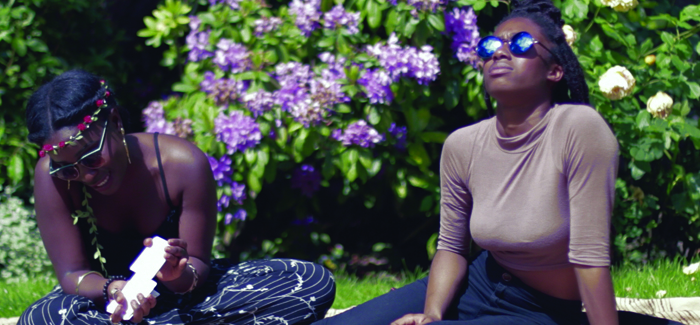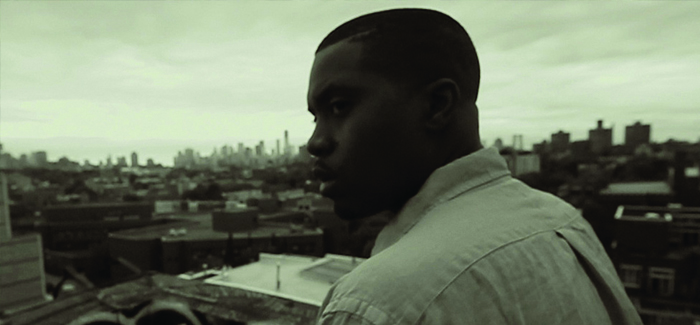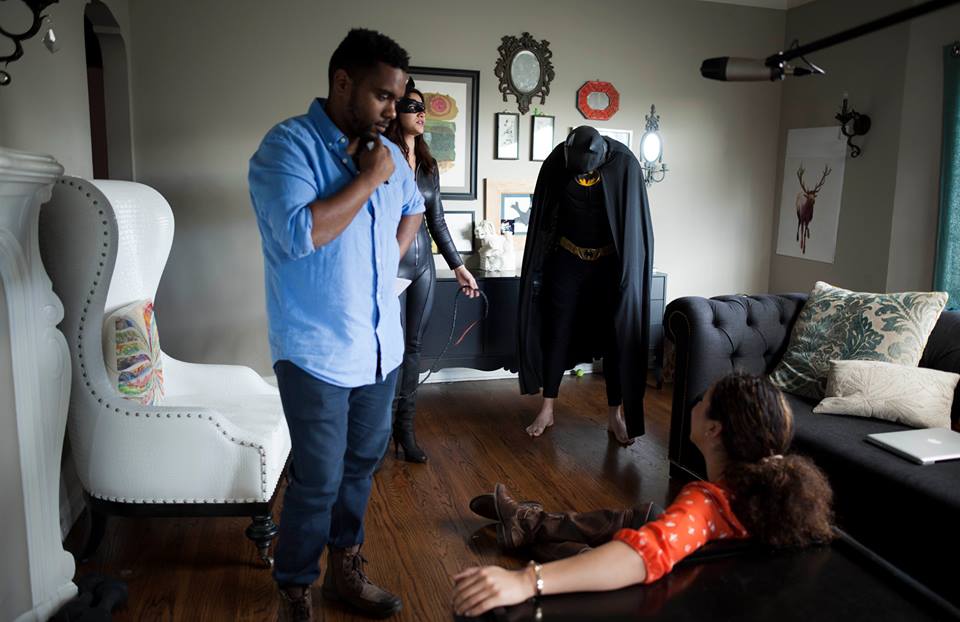Cecile Emeke is a London creative whose work meanders through the arts. Characterised by pop culture aesthetic and street-wise intellect, her films, poetry, and illustrations explore every day experiences of culture, politics, society and identity.
Her latest film, Ackee & Saltfish, follows a day in the life of “two ordinary girls in ordinary old East London”. The events in the film unfold as the main characters, Rachel and Olivia, go out to eat after a mishap with the preparation of the Jamaican national dish.The film will debut on the 13th of September at the Peckham & Nunhead Film Festival in London. Details about subsequent screenings and the films online release may be viewed at the http://ackeeandsaltfish.co.uk. The online release of the film will be complimented by the upcoming Ackee & Saltfish web series, with a date to be announced via the film’s website.
Here, Ackee & Saltfish creator Cecile Emeke shares more about the new film, the socio-political nature of her work, and the creative process…
D: Why should we watch Ackee & Saltfish? CE: You should watch Ackee & Saltfish because there is currently no film like it that exists.
D: Rachel and Olivia are two Londoners. Ackee & Saltfish is very Jamaican. May you tell us a bit about the cultural world of the film? CE: The cultural world of the film reflects that of London as most non first generational people of African descent currently know it; an overlap of Caribbean, African and British culture.
D: How does this film connect with the real world? CE: The film completely connects with the real world. Think of it as being a fly on the wall of an ordinary day of two ordinary girls in ordinary old East London.
D: The trailer suggests the action and mood of the film will be driven or embodied by Rachel and Olivia’s dialogue, much like the format of your current documentary series Strolling. What attracts you to presenting conversation in motion?
CE: I think something about walking and talking takes away the potential pretence of conversation. You literally have to think on your feet.
D: Strolling focuses of the thoughts and contemplations of others. Is Ackee and Saltfish your response to ideas expressed in the series? CE: Ackee & Saltfish aren’t connected responses to each other, but I can see the link people might draw. Some of the issues touched in the the documentary series are certainly important to Olivia and Rachel, but for no other reason than the fact that most people of their demographic, young twenty-somethings, are thinking and talking about similar thoughts to those expressed by the young twenty-somethings in strolling.
D: So far, your short films have been framed around questions of blackness and womanhood as political circumstances and the way in which they play out in the everyday- especially in relation to individuals, diaspora, popular culture and social institutions. Why?
CE: I wouldn’t say I intentionally frame my films around blackness, womanhood or any other socio-political issue, but those issues frame and centre themselves around me and my existence; I merely respond to them. My existence doesn’t allow me to ignore issues like race, feminism, capitalism and so on. It would take a huge splitting of my soul and serious case of double or triple consciousness to express myself and never mention or talk about the “blows” I take to my humanity daily, because I am a black, working class, British woman. Though double consciousness is something I was implicitly and extremely well trained in from birth, as I have gotten older I have learned to unlearn “being all things to all people and speak[ing] all positions but your very own”.
D: What do you think about the Caribbean Reparations Initiative being advanced by the Caribbean Community (CARICOM) governments?
CE: It’s sad to me that this has to even be a question in 2014. Britain, amongst others, received reparations from Germany after a 4-year long WW1. Japanese Americans received reparations from US after 4 years of internment camps. Jews received reparations from Germany after 7 years of genocide and holocaust. The list is endless because it has been common historical practice from all nations to pay reparations after a world crime against humanity has been committed.
The Caribbean and other nations of the African Diaspora suffered genocide, slavery, colonization and endured the biggest world crime against humanity for over 500 years, and arguably it is still ongoing, with consequences still playing out to this day due to the said 5 centuries of murder, plundering and destruction. Britain, the same country who claimed reparations over a 4 year war, is claiming it doesn’t owe nations anything after 500 years of genocide and slavery? That is shocking. By shocking I mean, shocking that humans are capable of such disinterested cruelty, hypocrisy and complete apathy, but not shocking that it is nations such as Britain, France, Portugal and so forth engaging in this ridiculous refusal to give back what is owed. Britain owes a whole bunch of reparations to the third of the world that they used to systematically abuse, from the opium wars in China to slavery in Caribbean…
D: Describe your creative process in three words.
CE: Honest, personal & carefree.
D: You tell stories through film, illustration and poetry. What does each medium allow you to express most effectively?
CE: Poetry allows me get really thorough with any idea of interest to me. Illustration gives me the opportunity to communicate a huge idea in a really accessible and hands on way. Film allows me to create a whole world, a future. It kind of allows me to put poetry/writing and illustration together; film is where my passion for words and art to flourish together.
D: I was excited to read that director Melina Matsoukas is one of your favourite artists. What do you love about her work?
CE: I love the bravery and experimentation in her work. She doesn’t shy away from trying new things or being unconventional and experimental. I love that.
D: Our favourite character in Ackee & Saltfish will be… CE: Olivia and Rachel are like two peas in a pod, or should I say, like Ackee & Saltfish. I think you will fall in love with them both for different reasons.
D: Any last words? CE: Thank you to everyone for the support so far, I really appreciate it. My aim is to be able to create the reflections of “us” – with no compromise – that have been missing for a long time, and the more support, the more we are all able to do that.
For more info about Cecile’s work and her film Ackee & Saltfish check out the following:




